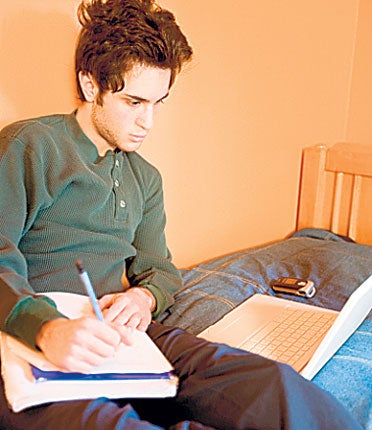'Webinar' method of learning could change the university experience for ever

Through your headphones it sounds like you're hearing the world think. Disembodied voices with accents spanning continents discuss with the intimacy of a late-night radio talk show each crystal-clear photograph that slides across the screens of our laptops on opposite sides of the world.
This is a webinar, and the delays to it caused by dodgy broadband here or there seem to add to our sense of togetherness rather than detract from it, whether we are in an office in Haiti, a tent in Darfur or lying on a bed in Oxford.
Webinars are, unsurprisingly, web-based seminars that began as one-way webcasts and have now evolved into interactive online conferences. Some may have as many as 1,000 people participating in them. And while those at the back of a classroom can never see, in a webinar everyone has a perfect view – and can see everyone else's annotations. What is more, each webinar can be recorded, and watched again.
Judging from the number of "how to run a knockout webinar" videos on YouTube, I am not the only convert. "Over the past 18 months to two years there has been a huge jump in the popularity of webinars," says James Robertson of webinar specialists World Trade Group. "In 2007 we had 2,300 people registered to attend about 10 webinars and three years later this had rocketed up to more than 10,000 people registered for more than 140."
He believes that this is due to "a vast improvement in webinar technology, allowing audiences to join easily and quickly from almost any location in the world, together with improvements in reliability and tools allowing for interaction". Hosts also have access to mute buttons and "hands-up" functions to mirror the way a group leader could call on individuals to answer questions or express their own ideas.
"The days of webinars being a 60min sales pitch are behind us and now people (at least in the business world) are finding real value in attending these sessions," he adds.
Paul Lowe is one of a handful of people pioneering the use of webinars in education in the UK. As a course director at the London College of Communication, he placed webinars right at the heart of his online MA in Photojournalism and Documentary Photography, and has seen them spread around the rest of the college.
"We realised that webinars were the perfect solution for people who wanted to study photography at a higher level but stay where they were living and working, and for whom the traditional to-and-fro emails of a typical distance-learning course lacked the immediacy they wanted."
Lectures, seminars and tutorials for the students on the course now all occur online in real time, while the students stay at homes or their office.
"It takes students and guest tutors a few minutes to get their heads round the idea before they are hooked," Lowe says. "Their shared interest in photography very quickly helps them develop a real sense that that they are part of a group exploring issues together, and the power of the collective experience of overcoming technical hitches just reinforces the bonds between them."
There may be worries as to how employers see such virtual courses; however, Paul Lowe believes that webinars also have a future at undergraduate level. "What's the point in getting everyone into campus for just one tutorial, when they can stay at home and attend online?"
It looks as though students will soon have another reason not to get out of bed.
Join our commenting forum
Join thought-provoking conversations, follow other Independent readers and see their replies
Comments
Bookmark popover
Removed from bookmarks